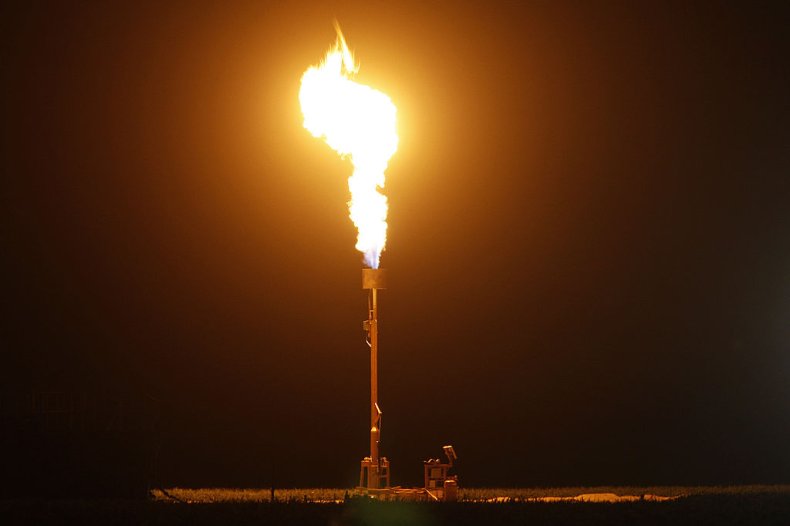Russia has declined to reduce oil exports at the request of Saudi Arabia along with OPEC that led to the biggest decline in oil prices in five years on Friday--causing another headache for the American economy as markets have already seen significant ups and downs due to the ongoing Coronavirus (COVID-19) outbreak.
Now some oil experts are predicting barrel prices as low as $20 within the year, while Russian President Vladimir Putin has voiced confidence that his country can weather out a sustained and significant price reduction. Some analysts have argued that Russia's efforts are intended to counter U.S. shale producers and push back against U.S. sanctions targeting the Nord Stream 2 oil pipeline, which would connect Russian oil directly to Europe.
"The Kremlin has decided to sacrifice OPEC+ to stop U.S. shale producers and punish the U.S. for messing with Nord Stream 2," Alexander Dynkin, president of the Institute of World Economy and International Relations in Moscow, a state-run think tank, told Bloomberg.
Putin told a meeting of finance and energy ministers on Sunday that "we need to be prepared for different scenarios," RT reported. He said that it was unclear how long the situation would continue, but expressed confidence that the Russian economy could deal with any fall out.

George Friedman, chairman of Geopolitical Futures, told Newsweek that Russia's refusal to cut production had more to do with combatting the economic impact of coronavirus and was not intended to directly target the U.S.
"The Saudi recommendation for cutting production in order to increase prices is something Russia could do only if prices rapidly increase," Friedman said. "But given the downward pressure from the coronavirus, I think the Russians calculated that cutting prices wouldn't stabilize them and refused the Saudi request. It was not intended to hurt the U.S. but to try to protect the Russian economy."
The situation escalated on Friday, as Russia refused to reduce oil output against the wishes of OPEC leaders, arguing that such measures unnecessarily benefited the U.S. Saudi Arabia, which is currently more dependent on maintaining the status quo when it comes to oil pricing, had urged Russia to join with OPEC to make the cuts.
Under Trump, the U.S. has surpassed Saudi Arabia and Russia to become the world's biggest oil producing nation, largely spurred by the expansion of fracking. Saudi Arabia had tried unsuccessfully to flood the oil market and reduce prices drastically to maintain its dominance back in 2014. But U.S. production proved more resilient than the Saudis anticipated.
Some analysts are suggesting that Russia may similarly be underestimating or misunderstanding how the U.S. oil industry will respond.
"While the crash in oil prices that began in late 2014 [due to Saudi Arabia flooding the market] did ultimately result in hundreds of shale producers declaring Chapter 11 bankruptcy, the net result of that process is that most of those companies reorganize themselves and come back with far less debt load," David Blackmon, an independent energy analyst and consultant, wrote for Forbes.
"The strategy also fails to recognize that most producers have already put hedges in place for most of their equity production through the remainder of 2020 and beyond," he noted.
But the Russian effort will certainly have an impact on the oil economy.
″$20 oil in 2020 is coming," Ali Khedery, who formerly worked as Exxon Mobil's senior Middle East advisor and is now the CEO of U.S.-based strategy firm Dragoman Ventures, tweeted on Sunday. "Huge geopolitical implications," he added.
A price dip of as much as Khedery is predicting would be a drop of more than half of what it is today, which would cut deep into oil producers' pockets. With coronavirus already reeking havoc on the stock market, Trump may find it to be more difficult to tout his economic achievements as his re-election campaign moves forward.
The president's re-election campaign did not immediately respond to a request for comment.
Republicans and Trump have consistently pointed to sustained GDP growth, healthy job creation and a booming stock market, as the November election approaches. They have argued that only Trump is positioned to maintain the economy moving forward.
But critics note that the president has failed to deliver the 4 to 5 percent economic growth he promised, pointing out that there were significantly better quarters of economic growth during former President Barack Obama's last four years in office. Additionally, the national debt and deficit has continued to rise substantially, with Trump's signature tax cuts having greatly reduced revenues, while primarily benefiting the wealthiest Americans and corporations.
While Russia would also be impacted by a significant decline in oil prices, it appears to have some room to maneuver before it feels the pain. Saudi Arabia needs a price of about $83 to balance its budget, while Russia only needs a price of about $42. Meanwhile, shale oil producers spend more to extract oil and generally break even with an average price of $68 per barrel.
Shale production has contributed about 10 percent to the current U.S. GDP growth over the past decade, according to a report by the Federal Reserve Bank of Dallas. A collapse in the price of oil could damage shale producers and lead to economic fallout.
As for Russia, the country's leaders are voicing confidence that their economy can withstand tanking prices. Russian Finance Minister Anton Siluano asserted last week that even prices as low as $30 would be fine. "We will finance our spending for four years without problems," he said.
https://news.google.com/__i/rss/rd/articles/CBMicGh0dHBzOi8vd3d3Lm5ld3N3ZWVrLmNvbS9wdXRpbi10YXJnZXRzLXVzLWZyYWNraW5nLW9pbC1wcmljZS13YXItbmV3LXRocmVhdC10cnVtcHMtZWxlY3Rpb24teWVhci1lY29ub215LTE0OTExMjbSAXZodHRwczovL3d3dy5uZXdzd2Vlay5jb20vcHV0aW4tdGFyZ2V0cy11cy1mcmFja2luZy1vaWwtcHJpY2Utd2FyLW5ldy10aHJlYXQtdHJ1bXBzLWVsZWN0aW9uLXllYXItZWNvbm9teS0xNDkxMTI2P2FtcD0x?oc=5
2020-03-08 16:45:15Z
52780639491845
Tidak ada komentar:
Posting Komentar